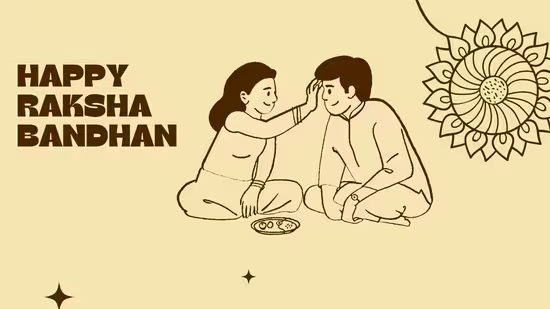Raksha Bandhan, celebrated with fervor across India, has always been more than just a festival. Rooted deeply in Indian culture, this festival symbolizes the bond of protection between siblings, traditionally celebrated by sisters tying a rakhi, a sacred thread, on their brothers’ wrists. In 2024, Raksha Bandhan continues to thrive, adapting to the changing dynamics of modern life while holding onto its timeless essence.
The Historical and Cultural Significance
Raksha Bandhan’s origins can be traced back to ancient Indian history, with legends that underscore the festival’s deep cultural significance. One of the most celebrated stories is from the Mahabharata, where Draupadi, wife of the Pandavas, tore a piece of her sari to bandage Lord Krishna’s bleeding finger. In return, Krishna vowed to protect her, symbolizing the essence of Raksha Bandhan—protection and care.
Another significant tale comes from the medieval period when Rani Karnavati of Mewar sent a rakhi to Mughal Emperor Humayun, seeking his protection against an imminent invasion. These stories reflect the festival’s role in fostering not just familial ties but also alliances based on trust and mutual respect.
The Evolution of Celebrations in Modern Times
As India has progressed, so have the ways in which Raksha Bandhan is celebrated. Today, the festival is no longer confined to the traditional brother-sister bond. It has expanded to include friends, cousins, and even non-biological relationships, highlighting its universal appeal.
Virtual Celebrations: With the rise of global migration and the spread of families across different countries, Raksha Bandhan has embraced technology. Virtual celebrations via video calls have become a norm, allowing siblings to participate in the rituals despite geographical distances. Online platforms offer a plethora of options to send rakhis and gifts, ensuring that the essence of the festival is not lost, even if siblings cannot meet in person.
Personalized and Eco-friendly Rakhis: The growing awareness of environmental issues has led to the popularity of eco-friendly rakhis made from seeds, recycled materials, and even edible components. These sustainable choices reflect a broader trend in Indian society, where traditional values are being adapted to fit modern, eco-conscious lifestyles.
Corporate Influence and Marketing: In 2024, Raksha Bandhan has also become a significant event in the commercial calendar, with brands offering special deals and products tailored for the festival. From jewelry to personalized gifts, the market is flooded with options that cater to various tastes and budgets, making Raksha Bandhan a celebration of love that also fuels economic activity.
Regional Variations in Raksha Bandhan
India’s diversity is reflected in the different ways Raksha Bandhan is celebrated across the country. While the central ritual remains the same, various regions infuse the festival with their unique customs and traditions.
In Rajasthan, the festival extends beyond the familial bond, with priests tying rakhis to their patrons, symbolizing spiritual protection. Maharashtra celebrates Narali Purnima, where the fishing community offers coconuts to the sea, praying for safety and prosperity. In West Bengal, the day coincides with Jhulan Purnima, where devotees swing idols of Radha and Krishna, seeking divine blessings.
These regional variations not only add a rich cultural tapestry to the festival but also highlight how Raksha Bandhan serves as a unifying force across diverse communities.
The Role of Media and Entertainment
Bollywood and Indian television have played a significant role in shaping the modern perception of Raksha Bandhan. Songs dedicated to the brother-sister bond and scenes portraying the emotional ties associated with the festival have become a staple in Indian entertainment. These portrayals help reinforce the values of love, protection, and familial duty that Raksha Bandhan represents.
Food: A Delicious Aspect of Raksha Bandhan
No Indian festival is complete without food, and Raksha Bandhan is no exception. The festival is marked by the preparation of traditional sweets and dishes that vary from region to region. In Rajasthan, Ghewar, a disc-shaped sweet made from flour, is a staple during the festivities. Maharashtra offers Puran Poli, a sweet flatbread, while Bihar brings Thekua, a traditional sweet made from wheat flour, jaggery, and ghee.
These culinary delights not only add flavor to the celebrations but also serve as a way to pass down recipes and traditions through generations, ensuring that the cultural heritage associated with Raksha Bandhan remains alive.
The Essence of Raksha Bandhan in 2024
At its core, Raksha Bandhan in 2024 remains a celebration of relationships, transcending beyond the traditional brother-sister dynamic to encompass a broader definition of protection, love, and mutual respect. Whether through physical presence or virtual connections, the festival continues to foster bonds that are essential to the fabric of Indian society.
The evolving nature of Raksha Bandhan reflects the adaptability of Indian culture, where ancient traditions find new expressions in contemporary contexts. As India continues to modernize, Raksha Bandhan stands as a testament to the enduring power of cultural practices that not only survive but thrive by embracing change.
Conclusion
Raksha Bandhan 2024 is a vibrant blend of tradition and modernity. It is a festival that honors the deep-rooted values of protection and love while adapting to the needs and realities of contemporary life. As families gather to celebrate this beautiful festival, whether in person or virtually, the essence of Raksha Bandhan remains unaltered—a celebration of the unbreakable bond between siblings and the universal values of love, respect, and protection.
In a world that is increasingly interconnected yet often divided, Raksha Bandhan serves as a reminder of the ties that bind us, transcending boundaries of geography, culture, and time. As the sacred thread of rakhi is tied, it is not just a ritual but a reaffirmation of the commitment to care for and protect one another, making Raksha Bandhan as relevant today as it was centuries ago.





